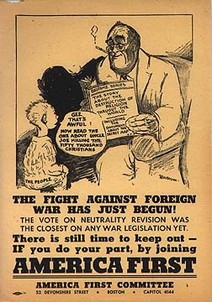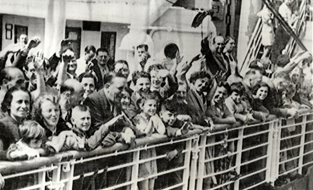World War II: Prelude
|
Profiles * Political Thought * Colonial Government * Revolution * Constitution * Birth of Party Politics * War of 1812 * James Monroe: "Era of Good Feeling" and Monroe Doctrine * Jacksonian Democracy * Regional Conflict and Compromise * 1860 Election of Abraham Lincoln * Civil War 1861-62 * Civil War 1863-65 * Reconstruction and Impeachment of President Johnson * Gilded Age and Progressive Era * 1912 Election of Woodrow Wilson * 1916 Election and World War I * Women's Suffrage * Depression and 1932 Election of Franklin D. Roosevelt * Prelude to World War II * Pearl Harbor and Mobilization * World War II: European Theater * World War II: Pacific Theater * Atomic Bomb and End of World War II * 1948 Truman-Dewey Election * 1960 Kennedy-Nixon Election * 1964 Johnson-Goldwater Election * Civil Rights Movement * Vietnam: Evolution of the American Role * Vietnam: Kennedy Administration and Intervention * Vietnam: Johnson Administration and Escalation * Vietnam: Nixon, Ford and Fall of South Vietnam * 1968 Humphrey-Nixon Election * Watergate Scandal and Resignation of President Nixon * 1976 Carter-Ford Election * 1980 & 1984 Reagan Elections * Clinton Impeachment * 2000 Bush-Gore Election * War in Iraq * 2008 Obama-McCain Election * 2016 Trump-Clinton Election |
|
|
While his margin in the November election dropped sharply from the landslide win in 1936, Roosevelt still easily defeated Republican Wendell Willkie, who argued for greater support of the anti-Nazi forces in Europe, by about five million popular votes and by 449 to 82 electoral votes.
War in the Pacific Meanwhile, in the Pacific, Japan viewed the German actions in Europe during the first half of 1940 as providing an opportunity to resolve its war in China, which had been going on since 1937, and allowing it to secure oil and other raw materials by seizing the British, French, and Dutch colonies of Southeast Asia. In July 1940, Roosevelt reacted to the advance by shutting off American trade with Japan. Japan then invaded the British and Dutch colonies in Southeast Asia followed by attacks on French Indochina in September. Unsuccessful negotiations between Japan and the U.S. continued in the following months in which it was proposed that Japan withdraw from most of China and Indochina after Japan and Nationalist China drew up peace terms, along with Japan avoiding a direct alliance with Germany and Italy. In July 1941, all Japanese assets in the United States were frozen, followed by an embargo on the export of U.S. oil and gas, a particularly severe blow to Japan, which imported over 80% of its oil from the U.S. After the embargoes and the asset freezes, the Japanese Ambassador to Washington, Kichisaburō Nomura, and U.S. Secretary of State Cordell Hull held several meetings in an unsuccessful attempt to resolve the conflicts. These talks continued, as part of the Japanese strategy to deceive the U.S. over its war plans, until December 7, the day of the attack on Pearl Harbor. |
|
|


